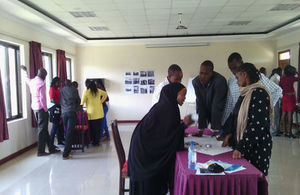International Day of the Girl Child: UK aid is supporting initiatives to support adolescent girls in Wajir
Using biometric technology to track girls’ school attendance

Biometrics registration. Photo: Save the Children
Wajir is one of the poorest and most arid counties in Kenya, where the population is chronically poor, routinely food insecure, and drought prone and marginalised. In a country where many adolescent girls face considerable risks and vulnerabilities that affect their education, health and well-being—including early marriage, teenage pregnancy, and violence—delivering support to girls in the most hard-to-reach areas of Kenya can be a challenge.
UK aid is supporting the Adolescent Girls Initiative- Kenya (AGI-Kenya) to conduct a biometric registration exercise for 3,000 adolescent girls in 60 schools in Wajir County. Implemented by Save the Children, the exercise uses easy-to-use and inexpensive equipment to read students’ fingerprints to record daily attendance. The biometric information is then used to identify those students who meet the conditional threshold of 80% school attendance and, therefore, qualify for a cash transfer twice a term. The cash transfer goes to their household head, whose biometric details have also been captured and linked to a bank account to facilitate electronic household cash transfers. The biometric system generates reliable data at a much lower cost than other conditional cash transfer initiatives.
“Though it is a little time consuming to register one beneficiary, it will be fairly easy to use the information later to mark school attendance as they will just be checking in and out and not going through the whole detailed process,” says Muktar, one of the research assistants engaged in registering the beneficiaries.
Girls meeting the 80% attendance condition will also have their school fees paid and their school will also receive financial support for school operations.
AGI-Kenya is a two-year programme that is targeted at 6,000 girls aged 11 to 14 in Wajir County and the Kibera slums in Nairobi County. It is part of the UK’s Department for International Development’s commitment to reduce the cost of education in the poorest households, increase and improve the provision of low-fee schooling in informal settlements, and provide more appropriate types of education for children in nomadic and pastoral communities in Kenya.
Facts and Stats:
- The UK is committed to delivering results for girls and women in Kenya who continue to bear a disproportionate burden of poverty.
- Under its vision of getting girls through secondary school, DFID is working to increase the number of children and especially girls attending school in urban slums and the arid lands and improve education quality.